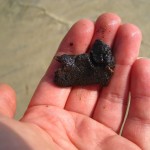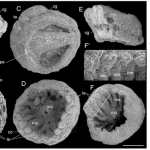 I am very excited that the new year brings an exciting opportunity for me. I was solicited, and I accepted an Academic Editor position with the open-access journal PLoS One. PLoS one invited me to join to increase the presence of ecological and marine biological studies at the journal. Many of you may have noticed my hints in the last month.
I am very excited that the new year brings an exciting opportunity for me. I was solicited, and I accepted an Academic Editor position with the open-access journal PLoS One. PLoS one invited me to join to increase the presence of ecological and marine biological studies at the journal. Many of you may have noticed my hints in the last month.
For those of you who don’t know, or have a skewed view, here is what the open-access concept represents. Publications are full text, peer-reviewed articles, that occur online and can be accessed at no charge to the user. Note that these are permanent and the review process is designed for quick turnarounds between submission and publication. After acceptance, publication occurs almost immediately. Papers are again free to download, copy, and distribute.
Why did I join? I whole-heartedly believe in open-access journals. I have to admit Bora’s consistent championing of open access and some thoughtful words from Jonathan A. Eisen began my own thoughts on open access. One of the most important aspects of science is communication, both among scientists and between scientists and the public. How can this occur freely when scientific papers are hidden behind walls of memberships and subscription fees? What concerns me is that access to information, research often paid for by the public through taxes, is a privilege of wealthy academic institutions and well-funded scientist or laboratories. A close friend of mine is the head science librarian for a university. His tales of dropping major journals as subscriptions rise is horrifying. Most universities are not increasing library budgets enough to meet drastic increases in journal subscriptions. Even well-funded, individual scientists can afford subscriptions to only a few journals thereby making much of the literature difficult at best to access. I encountered this all too frequently on my $12,500 year graduate stipend in Boston. There are some journals that have gone through great lengths to keep individual subscription fees down. I both subscribe and publish at these journals. But other journals have become enlisted in the megaconglomerate publishing houses that are for profit. Can/should the dissemination of scientific knowledge be for profit?
Open-access journals can only make science more transparent.






Here Here! Congratulations Craig, I am looking forward to seeing more marine biology in PLoS ONE. Another positive component to Open Access is the accessibility to the general public. Perhaps a small part of america’s decline in science education is due to the lack of accessible research results behind publishers’ locked doors. Teachers and enthusiatic students cannot find references to delve further into interesting topics. If there is one thing that irks me the most, it is the iron wall put in the face of student’s curiosities. Like you mention, the information is already paid for to the public by government dollars. It amazes me that governments allow their “property” to be locked down by private interests.
I never thought much about it until I couldn’t get a pdf copy of my own publication. How does PLoS One rate compared to some others?
good on you, deep sea news guy, on advancing open access!
just my 2 cents on the roots of america’s decline in science education (as kevin puts it)… while i’d wager that closed access might play some part there, i suspect it has more to do with the overall poor performance on the part of scientists themselves to be accessible and understandable to non scientific audiences… the great popularizers of science (sagan, gould, deGrasse tyson, etc) didn’t/don’t let jargon or complexities of their field stand between their efforts and public understanding… in fact, it’s when they make the effort to go into the complexities and subtleties of their work that they are at their most engaging and understandable (i think)…
it also doesn’t help that a lot of professional scientists don’t see broader public outreach and understanding as being their responsibility… so much so that nsf has to now ask investigators to demonstrate broad impact of their work into rfp’s… and sorry, a powerpoint-driven lecture ‘aint broad impact… in the ocean sciences alone, nsf had to develop the cosee (centers of ocean science education excellence) approach to specifically target avenues for oceans scientists to broadcast their work to the public… and i can tell you from first hand experience (as one of the founders of cosee california) that it was like pulling teeth to get ocean scientists at scripps to see the value to this effort…
When Big Media newspapers say that some research found out some thing or another, the article never have enough information to understand important stuff about the experiment and how they’ve analized their data. It’s really annoying. Open publications will solve that problem for me.
One of the most important aspects of science is communication, both among scientists and between scientists and the public.
For Sure! If you have information that could save the world but they don’t know it, or have been told differently by an interpreter who pays for access to the info, the ability to accomplish any good is lost!
Dave Briggs :~)
PLoS One sounds great, but I hear it costs $1250 US to publish there if you are not from a third world country. Is it true?
The publications costs are covered by page charges. This amounts to $1250 which is about midpack for pages charges.
Actually, $1250 is pretty high for what I’m used to in astrophysics. Being at a small, underfunded, primarily undergraduate school, page charges are a *big* hurdle to my being able to publish in open access journals. So, though I whole-heartedly support the open access idea, I rarely am able to publish in these journals.
Of course, we in physics/astronomy tend to get around the open access problem by posting our papers on the arXiv.
As far as publication fees go PLoS ONE like all PLoS publications run a waiver scheme. If you do not have the funding to cover the Author fee you can ask for a waiver and pay what your funding will allow, and that can be nothing if you just don’t have the money in your budget.
Editorially this has no effect as the Editors don’t know who has requested waivers.
That’s excellent! Thanks for the info, now I know where to send my next paper :)
Chris,
Thanks for the noob support by providing information about page charges at PLoS.
Congratulations Mr. McClain. I hope this proves a long-lasting relationship.
As to open access, I hope to see more put out there so that laymen such as moi can at least get a sense of some directions today’s research is headed. Brian Thomas is right; arXive is a great thing for all of us who like to delve a bit further than the main page of publications.
From another perspective…
I was recently quoted $1500 for a species description article at a small “in house” journal (impact factor 0.4 for what its worth), estimated at 22 pages (before revisions). I would love to publish in PLoS, but according to the rules of taxonomy, species descriptions have to be printed in ink or on a CD stored at an institution somewhere (i.e. museum, university). I really think PLoS can reach out the taxonomic community by depositing a paper copy or CD at the Smithsonian once a month until this rule is changed to reflect the times AND by lowering fees by half for species descriptions, revisions and monographs. Taxonomists work on little to no money. It doesn’t cost much to look at a critter under a microscope. Open access to species descriptions only results in increased accuracy and precision for other sciences utilizing those descriptions (i.e. ecology, biodiversity and evolution as well medical sciences)
Hey, I want second what Kevin Z has said about sharing information so that the general public gets access to that which we are funding.
I am not a marine biologist, but I play one on my blog sometimes; and there have been times when I am reading a pop sci article about a topic that interests me but I don’t think I am getting enough of the story. I can find a study on PLoS and it helps me to understand it better.
As far as Rick goes, I sincerely disagree that scientists aren’t good at communicating to the public. I can think of many of you who do a great job and the ScienceBlogs have a bunch of good communicators here.
mike…
disagree all you want but i wouldn’t base your conclusions of scientists as exemplars of good communication on what you see in the blogosphere… these are not the bell curve middle of the scientific community to which i refer… craig, and other scientist bloggers (as opposed to science bloggers) are indeed attempting to bridge the communication gap that is well acknowledged within the educational community (and apparently the nsf as well)…
open access is great…. i’m all for it… but plos will be used by scientists and the scientifically inclined… i don’t think if the journal science had been free all these years you’d suddenly have seen a spike in a non-scientifically inclined readership… same thing if sports illustrated were suddenly free, i’m not inclined to go out of my way to read it… perhaps i’m comparing apples and oranges here, but i think there’s an analogy to be made…
finally, it depends on what you mean by “does a great job communicating”… if you mean they are read/listened to by an already scientifically literate citizenry, that’s great, but they are preaching to the converted or to an audience receptive to science… what about reaching the non-scientifically inclined, or the under-represented populations in science… in my opinion, scientists need to be conscious of that responsibility as well…
The journal Ecology, published by the Ecological Society of America, will soon open access to its published Reports, which are the shorter articles. The problem in scientific publishing is the big corporate pigs which charge exorbitant subscription fees and keep important science closed to all but the wealthiest minority. Were the monies paid by university libraries and medical schools for subscriptions instead dedicated to page charges, journals such as PLOS and Ecology would flourish and the big corporate pigs would perish.
Well stated Don